Key takeaways:
- Price alerts serve as essential tools for proactive budgeting and help consumers secure deals without constant monitoring.
- Effective price comparison can lead to significant savings and enhances consumer confidence by fostering market competition.
- Building a budget helps prioritize spending and encourages mindful purchasing, preventing impulse buys.
- Maximizing savings involves flexibility, strategic timing, and combining price alerts with coupons for greater discounts.
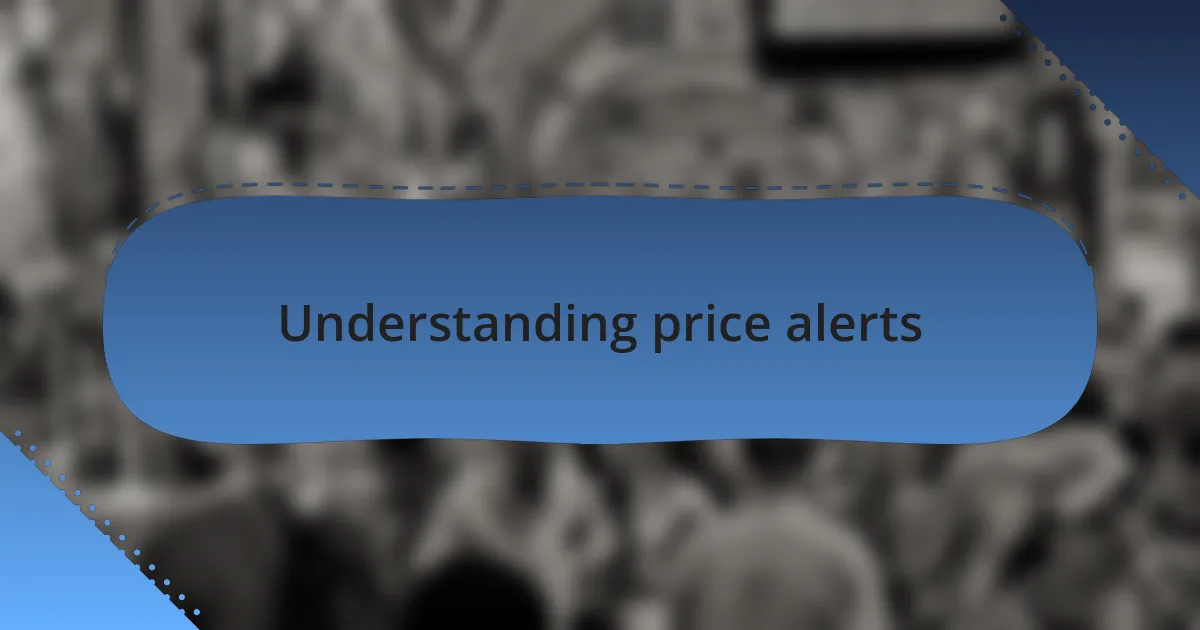
Understanding price alerts
Price alerts are like having a personal shopping assistant that keeps an eye on your favorite products. Whenever the price drops to a level that fits my budget, I get a notification, allowing me to jump in before the deal disappears. It feels like I’m catching a rare moment, similar to that thrill of finding a once-in-a-lifetime sale at a store.
I remember the excitement I felt when I set a price alert for a camera I had been eyeing. Days turned into weeks, but the moment I received that alert about a significant price drop, it was as if the universe was aligning for me. Can you relate to that rush? It’s a powerful reminder that patience and the right tools can lead to rewarding purchases.
What I appreciate most about price alerts is their ability to free me from constant checking. Instead of being tethered to my shopping lists, I can focus on other things, knowing that I won’t miss out. Doesn’t that sound liberating? With price alerts, my budgeting becomes proactive rather than reactive, turning my shopping experience into something much more enjoyable.
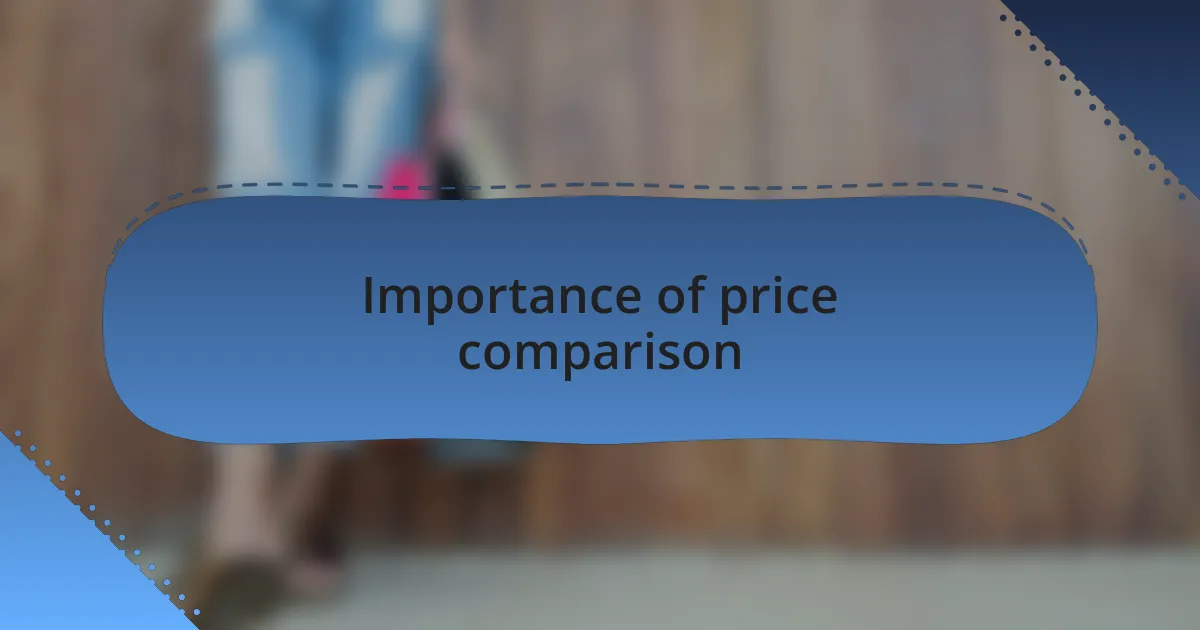
Importance of price comparison
Price comparison is crucial in today’s marketplace where prices can fluctuate rapidly. I once found myself in a scenario where I was about to make an impulse purchase, only to take a moment and check a comparison site. That brief pause saved me nearly 30% on a pair of shoes that were listed for a much higher price elsewhere. Have you ever stopped to check before buying? It’s amazing how a little foresight can lead to substantial savings.
Another aspect I value is how price comparison enhances transparency. When I compare prices across different retailers, I gain a clearer understanding of what I should be paying. This clarity not only empowers me as a consumer but also enriches my overall shopping experience. I remember the confusion I faced during my early shopping days, often wondering if I was getting a good deal. Now, armed with price comparison tools, I feel more confident in my choices.
Moreover, price comparison fosters competition among retailers. I often notice that when one store drops a price, others follow suit to maintain their customer base. It’s like watching a dance unfold in real-time. This competition not only benefits me as a shopper by providing better deals but also cultivates a healthier market overall. Isn’t it satisfying to know you’re part of that dynamic? I feel a sense of triumph each time I secure a deal thanks to taking the time to compare prices.
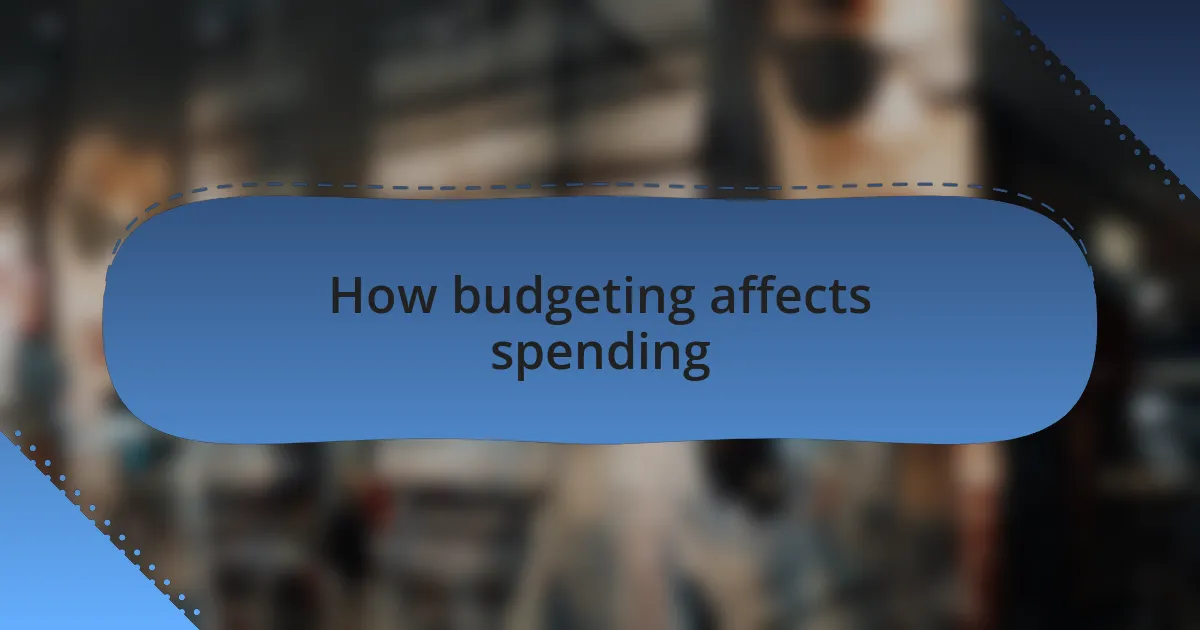
How budgeting affects spending
When I started budgeting, I quickly realized how it fundamentally altered my spending habits. At first, tracking my expenses felt like a chore, but eventually, I discovered that it helped me prioritize what I truly needed versus what I simply wanted. Have you ever felt that twinge of guilt after an impulse buy? By setting aside a clear budget for discretionary spending, I felt a stronger sense of control over my finances.
One memorable experience occurred when I found myself eyeing a new gadget. Initially, I impulse-shopped and almost purchased it right away. However, thanks to my budgeting practice, I stepped back and reconsidered. I asked myself if this purchase aligned with my financial goals. It turned out it didn’t, and skipping that buy allowed me to redirect those funds toward something that genuinely mattered. I felt empowered, knowing I made a conscious financial decision rather than a spontaneous one.
In essence, budgeting acts as a guiding light in a sea of choices. Each time I review my budget, it serves as a reminder of my priorities and aspirations. It’s like holding a mirror to my spending habits and reflecting on what truly brings me joy. Have you ever looked at your spending differently? That shift in perspective can be eye-opening and transformative, leading to healthier financial habits overall.
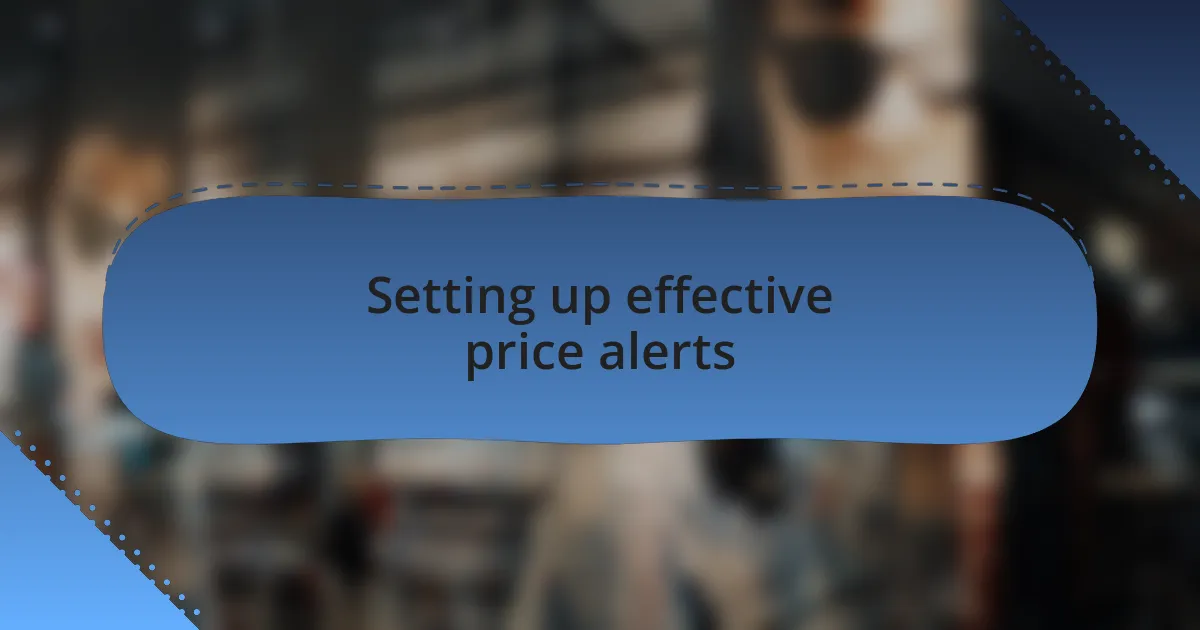
Setting up effective price alerts
Setting up effective price alerts has been a game changer for me. When I started using them, I made sure to focus on specific products I was genuinely interested in instead of casting a wide net. This approach not only kept my alerts relevant but also helped me resist the temptation to purchase items I didn’t really need.
I remember setting an alert for a camera I had my eye on for months. With the alert in place, I was able to enjoy the anticipation without succumbing to impulse buys. When the price finally dropped, it felt like the universe was aligning, and I could confidently make a purchase that fit my budget. How often can we say that about our spontaneous buys?
To maximize effectiveness, I recommend adjusting the frequency of notifications. I found that daily updates can become overwhelming, so I opted for weekly summaries. This way, I stay informed without feeling inundated. Have you ever been caught in the frenzy of constant notifications? By streamlining the process, I could better engage with the prices and truly evaluate whether I was ready to buy.
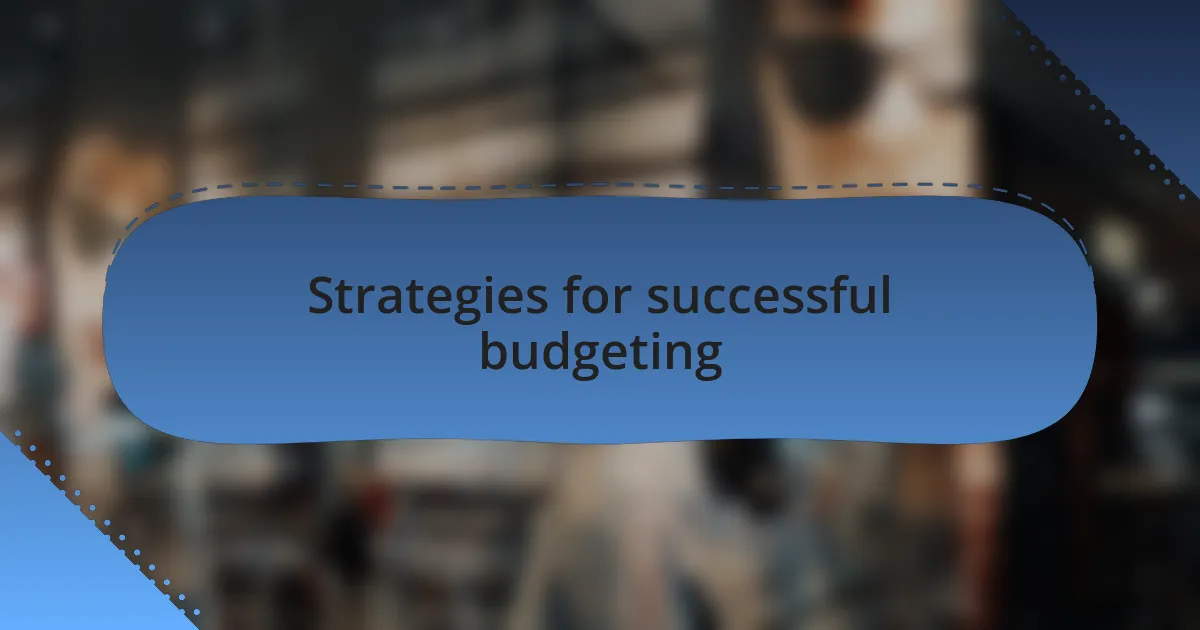
Strategies for successful budgeting
One effective strategy for successful budgeting is to create a clear spending plan that aligns with your financial goals. I recall sitting down with my own expenses and drawing a simple chart. Breaking down monthly costs into categories like essentials, savings, and discretionary spending allowed me to see where my money was going. How often do we overlook the small purchases that can add up? I was surprised at how quickly those little expenses snowballed into significant amounts.
Incorporating the principle of “paying yourself first” has also been pivotal for me. After learning about this approach, I started automatically transferring a set amount to my savings account right after I received my paycheck. It felt empowering, like I was truly prioritizing my financial future instead of just reacting to my expenses. Have you ever considered how a shift in your mindset can change your spending habits? This simple change not only reinforced my budgeting skills but also gave me a sense of security that I hadn’t previously felt.
Lastly, practicing mindful spending can dramatically alter your budgetary landscape. I often take a moment to reflect before making a purchase, asking myself if it truly aligns with my needs and goals. This habit has saved me from many impulsive buys that I would have regretted later. It’s amazing what a little pause can do. Have you tried this approach? It not only helps in sticking to my budget but also fosters a more intentional relationship with my money.

Personal experiences with price alerts
I first discovered price alerts when I was hunting for a new laptop last year. I set alerts on several websites, and it was a game changer. One day, I received a notification that the model I wanted was suddenly $150 off. It felt like winning a small lottery, and that rush of joy only reinforced the value of keeping an eye on price fluctuations.
Another time, while looking for a winter coat, I had mixed feelings about spending a lot. After setting up alerts, I felt a sense of control—I didn’t rush into a purchase just to get something. Finally, I received an alert that the coat I had been watching dropped to my budget threshold. That moment solidified my belief in price alerts; they transformed my approach to necessary purchases, making me feel savvy and strategic about my spending.
I remember a period when I was watching out for a specific fitness tracker. I almost bought one at full price when an alert came in just in time. Waiting for the right moment not only saved me money but also reinforced a valuable lesson: patience can lead to significant savings. Have you had a similar experience where waiting made all the difference?
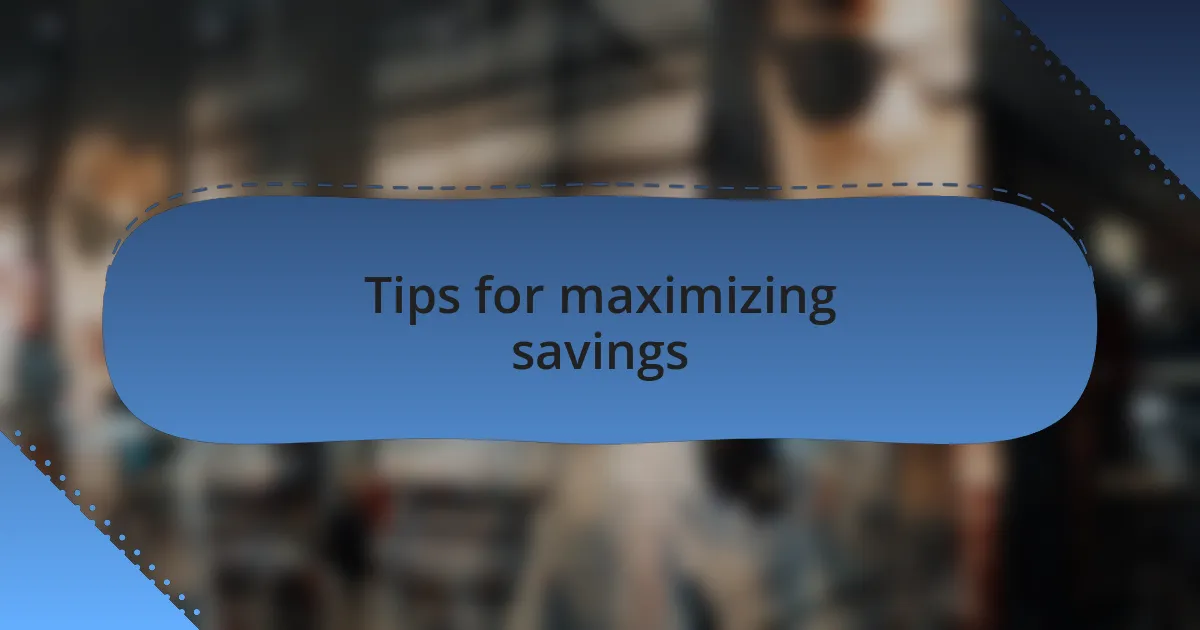
Tips for maximizing savings
Setting price alerts is just the beginning; to truly maximize savings, I recommend being adaptable. I remember when I set an alert for a gaming console. I had my heart set on a specific model, but when the alert popped up for an alternative model at a lower price, I took a moment to reconsider. That flexibility allowed me to snag a great deal while still getting what I wanted, just in a different package. Have you ever found a better deal by staying open to alternatives?
Another tip is timing your purchases strategically. I’ve noticed that certain products, like electronics, often have seasonal price drops. For instance, waiting until after the holiday season to buy a new TV paid off handsomely when the price slashed by over 20%. So, keep track of sales cycles; your wallet will thank you later.
Lastly, combine your price alerts with coupon websites for double the savings. One time, I applied a coupon on top of an alerted discount while shopping for home essentials. The satisfaction of seeing that final price drop even lower was exhilarating! When was the last time you felt that rush of getting an unexpected deal?